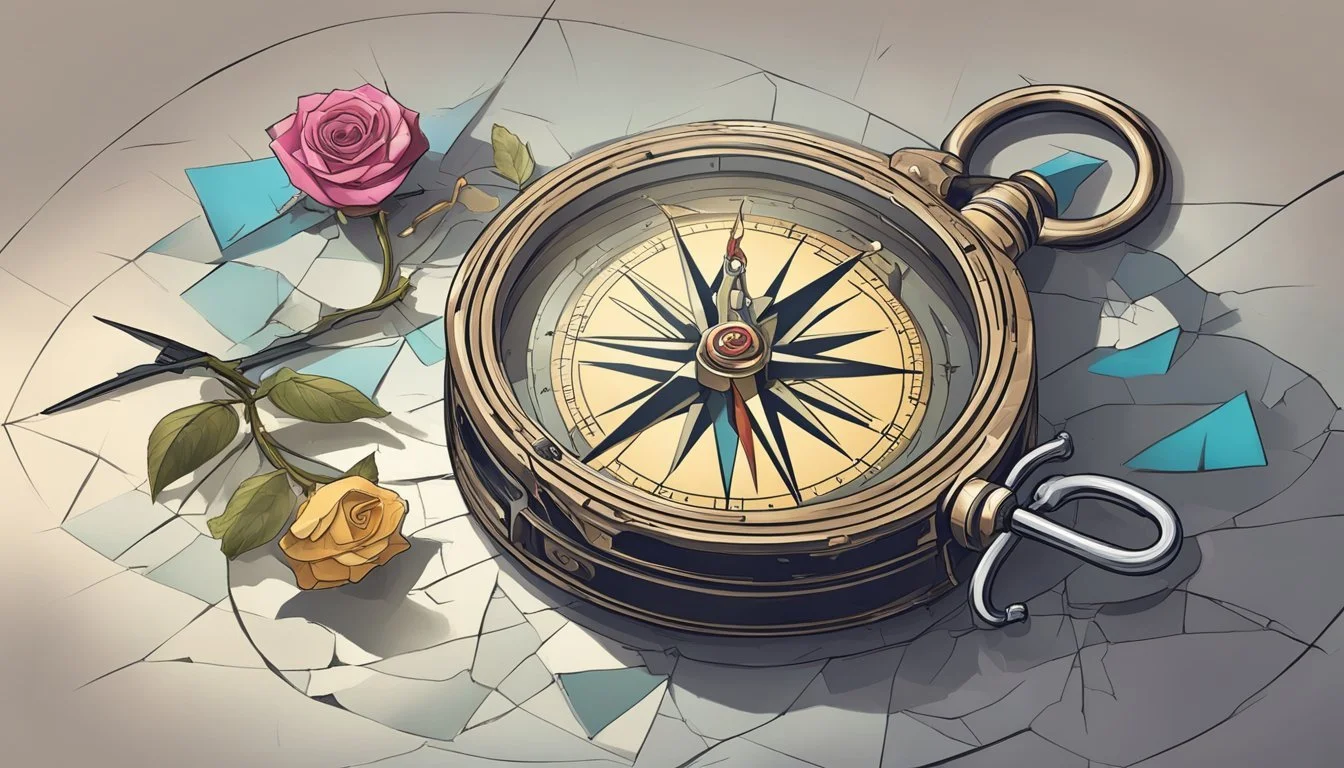9 Signs You May Be Outgrowing Your Relationship
Key Indicators to Watch
Relationships often evolve as individuals grow and change over time. While some relationships adapt and thrive, others may begin to feel strained or misaligned. Recognizing these shifts is crucial for personal well-being and can help in making informed decisions about the future of the partnership.
Identifying the signs of outgrowing a relationship helps individuals understand when it might be time to reevaluate their connection with their partner. Emerging differences, changing life goals, and evolving personal values often signal the need for a deeper look into the relationship’s health and viability.
1) You Prefer Time Alone
Feeling the need for more alone time can signal that one is outgrowing their relationship. Initially, spending time together might have been a priority, but now, solitude seems more appealing.
They may find themselves seeking activities or hobbies that exclude their partner. This isn't necessarily about avoiding their partner, but about finding personal space and freedom.
Spending time alone could become a necessity to recharge and reflect. It often indicates a change in emotional needs, revealing a shift in priorities.
If their partner feels like an obligation rather than a joy, it's a strong sign of emotional distance. This emotional detachment can gradually widen the gap in the relationship.
Wanting to be alone more frequently might demonstrate a need for independence. This desire for autonomy can lead to significant changes in the dynamics of the relationship.
2) Conversations Feel Forced
One telltale sign of outgrowing a relationship is when conversations that once flowed effortlessly now feel strained. When interactions become superficial or less engaging, it might indicate a deeper disconnect.
If previously shared interests no longer spark engaging discussions, this shift can reflect divergent paths. Conversations may lack the depth and spontaneity they once had.
Feeling disinterested in each other’s stories or opinions can also be a sign. When dialogues feel more like obligations than genuine exchanges, growth may be taking you in different directions.
It's common to notice that you and your partner are no longer investing similar effort into communication. As interests change, it’s natural to find fewer common topics to explore.
According to psychology, forced or superficial conversations signal a lack of alignment, which is often crucial for maintaining a strong connection. If this pattern persists, it might be time to evaluate the relationship’s future.
3) Goals and Dreams No Longer Align
When two people first come together, their goals and dreams often align closely. Over time, individuals grow and their aspirations can evolve in different directions. This shift can be a significant indicator that the relationship may no longer be as compatible as it once was.
She may prioritize career advancement and personal growth, while he seeks stability and a traditional lifestyle. These differing priorities can create tension and conflict. They may find it challenging to support each other's ambitions effectively, leading to frustration.
Dreams about the future, such as starting a family or moving to a new city, can become points of contention. One partner dreams of travel and exploration, while the other desires home ownership and settling down. These fundamental differences can strain the relationship.
Mutual support becomes harder to maintain when goals diverge significantly. They may struggle to find common ground, resulting in a feeling of moving in separate directions. Over time, this can erode the connection they once shared. If they find themselves unable to align their dreams and goals despite efforts, it may be a sign they are growing apart.
For more information on signs of outgrowing a relationship, visit Ideapod.
4) Increased Interest in Others
One potential sign of outgrowing a relationship is a noticeable increase in interest in other people. This doesn't necessarily imply a romantic interest but can include seeking new friendships or spending more time with colleagues.
When someone finds themselves more excited about interacting with others rather than their partner, it can indicate a shift in emotional needs and desires. This change may reflect a search for qualities or connections their current relationship no longer provides.
Increased attention toward others can also manifest as emotional investment. If he or she frequently shares personal thoughts or feelings with people outside the relationship, it could be a sign of looking for support and understanding elsewhere.
Sometimes, this shift coincides with major life changes or realizations. For instance, the individual may have developed new interests or perspectives, leading to deeper connections with different social circles. This can be a natural progression but can also highlight misalignments with their partner’s growth and values.
Recognizing these signs early on allows for open communication. Addressing these shifts may provide clarity about the future direction of the relationship, whether it involves working through issues together or considering alternative paths.
5) More Frequent Arguments
In a relationship, an increase in arguments may signal that the connection is weakening.
When partners start fighting more often, it could indicate underlying tensions or unresolved issues. The frequency of these conflicts might reflect growing emotional distance or diverging values.
Constant conflict can be exhausting for both parties. Frequent arguments can damage the emotional health of the individuals involved and strain the relationship dynamic.
If disagreements turn into prolonged battles without resolution, it might mean that both partners are struggling to communicate effectively. This persistent friction can erode mutual respect and understanding.
Fights that were once rare but are now a regular occurrence might reveal deeper incompatibilities. Frequent arguments could also be a sign that one or both partners are feeling unfulfilled or misunderstood in the relationship.
Addressing the root causes of these conflicts is essential. Sometimes, seeking external help, such as couples therapy, can provide a neutral space to work through issues constructively. Exploring the reasons behind frequent arguments can help determine whether you're truly outgrowing the relationship or if there are ways to reconnect.
6) Avoiding Physical Intimacy
Physical intimacy is a critical component of many relationships. When one starts avoiding touch, cuddling, or other forms of physical affection, it may signal that emotional and physical connection has diminished.
Partners who avoid physical intimacy might frequently withdraw from contact or express disinterest in physical closeness. This distancing can be a protective measure or a sign of growing apart.
Behavior such as sleeping in separate beds or consistently turning down opportunities for physical closeness often points to deeper issues. This avoidance can create emotional rifts, making it harder to communicate and feel connected.
Fear of vulnerability or unresolved conflicts may reinforce this avoidance. Individuals might protect themselves by distancing, fearing judgment or rejection. Understanding these behaviors means considering both emotional and physical dimensions.
For more insights, consider reading about avoiding intimacy in relationships on Marriage.com. Recognizing these signs early can help address underlying issues and potentially strengthen the relationship.
7) Feeling Stagnant
When someone feels stagnant in a relationship, it often means their personal growth is being hindered. They may feel like they are not evolving or learning new things due to the relationship dynamics.
This can occur when one partner is not supportive of the other's ambitions. They might feel held back or unable to pursue their interests and goals.
Moreover, a stagnant relationship can feel repetitive. Conversations, activities, and routines may become monotonous, making the relationship feel more like an obligation than a source of joy.
A sense of stagnation can also reflect emotional disconnection. As partners grow, they may need different emotional support, which is not being met.
If one feels their partner is not changing or growing, it may create a sense of moving forward alone. This can be particularly distressing in long-term relationships.
Experiencing stagnation can lead individuals to question their future together. They might wonder if staying will impede their personal or professional development.
Ultimately, feeling stagnant can act as a sign that the relationship needs reassessment or revitalization. There might be a need to address underlying issues or consider whether the relationship is still beneficial for both partners.
For more information, check out 9 Signs You've Outgrown a Relationship and How to Adjust for detailed signs and suggestions.
8) Loss of Respect
In a relationship, respect is crucial for maintaining trust and emotional well-being. When one partner begins to lose respect for the other, it can lead to significant issues.
Public humiliation, for instance, is a clear sign of disrespect. Making sarcastic remarks or derogatory jokes about a partner in front of others can erode trust and cause emotional harm. This behavior indicates that one partner no longer values the other's feelings.
Belittling or undermining a partner's achievements or opinions is another form of disrespect. If one starts to dismiss the other's ideas regularly, it can create distance and resentment. This behavior shifts the relationship dynamic into an unhealthy power imbalance.
Disrespect can also manifest in a disregard for boundaries. This includes not listening to a partner's concerns or continually breaking promises. Consistently ignoring a partner's needs shows a lack of consideration and empathy.
These signs of disrespect can be damaging to the foundation of any relationship. If these issues are persistent, it may indicate that the relationship is no longer nurturing and supportive for both parties involved.
For more information on identifying these signs, consider reading about lack of respect in a relationship. By recognizing these signs early, steps can be taken to address them or decide whether it’s best to move on.
9) Different Values
One clear sign that you may be outgrowing your relationship is when your values start to diverge. Values often shape the core of one's life decisions and priorities. When these differ significantly from those of your partner, it can lead to frequent disagreements and frustration.
As people grow and evolve, their values may shift. What once seemed like shared core beliefs can become areas of conflict. For example, one partner might prioritize career advancement, while the other might focus more on work-life balance or family life.
Significant differences in values can cause strain in daily interactions and decision-making processes. If one person values financial security and saving, while the other prefers spontaneous spending and adventures, it can create tension and misunderstandings. This misalignment often reveals deeper compatibility issues.
The challenge becomes greater when these value differences influence major life choices. Disagreements on issues like marriage, having children, or lifestyle preferences highlight the growing gap between partners. This gap can be hard to bridge if both individuals are not on the same page about their future direction.
Recognizing and addressing these differences as they arise is crucial. It allows both partners to evaluate whether they can move forward together or if it's time to part ways. Understanding the importance of shared values in a relationship is key to long-term compatibility and happiness. If left unchecked, these differences can erode the foundation of the relationship.
The Dynamics of a Healthy Relationship
A healthy relationship thrives on mutual emotional connection and aligns closely with shared life goals. Both aspects are crucial for maintaining a fulfilling partnership.
Understanding Emotional Connection
Emotional connection forms the foundation of a healthy relationship. It involves open and honest communication, where both partners feel safe expressing their feelings and thoughts. This type of connection fosters trust and empathy, encouraging partners to support each other through life's challenges.
It's important for couples to regularly engage in meaningful conversations and genuinely listen to each other. Being attuned to each other's emotional needs strengthens the bond and ensures that both individuals feel valued and understood. Emotional intelligence plays a significant role here, as it helps in recognizing and validating each other’s emotions.
Small gestures of affection, such as kind words, physical touch, and acts of kindness, also contribute to a deeper emotional connection. These actions help reinforce the sense of closeness and intimacy.
Importance of Shared Goals
Shared goals are essential in a healthy relationship because they provide direction and a sense of unity. When partners strive for common objectives, whether in career, family, or personal growth, it creates a shared purpose.
Partners should discuss their short-term and long-term goals to ensure alignment. This includes decisions about career paths, financial planning, and lifestyle choices. Aligning on these major life decisions can prevent conflicts and misunderstandings.
Regularly revisiting and adjusting goals as needed is also critical. Life circumstances change, and it’s important for both individuals to remain flexible and adaptable. When partners work together towards common aspirations, it strengthens their commitment and connection, making the relationship more resilient.
Having shared hobbies or activities can also mirror the importance of shared goals. These joint endeavors can foster a sense of teamwork and shared achievement, which are vital for the relationship's longevity.
How to Assess Your Relationship
Evaluating a relationship often revolves around assessing personal growth and the effectiveness of communication between partners. Understanding these aspects can provide clarity on whether the relationship is flourishing or stagnating.
Evaluating Personal Growth
Personal growth is crucial in any relationship. Individuals should examine if they feel supported in their personal ambitions and whether the relationship allows them to evolve. If one partner feels stifled or held back, it can indicate issues.
Consider if both partners are encouraging each other to pursue their interests and professional goals. Reflect on how much both parties have grown since the relationship began. Relationships should not only provide comfort but also challenge and inspire growth.
Communication and Understanding
Effective communication is the backbone of a healthy relationship. Partners should feel free to express themselves without fear of judgment or conflict. Assess how often meaningful conversations occur and whether both feel heard and understood.
It's important to notice if conflicts are resolved constructively, with both parties feeling respected. Listen to each other's points of view and work together to find solutions. This fosters a sense of teamwork and mutual respect.
Find out more on how to evaluate relationship health.




